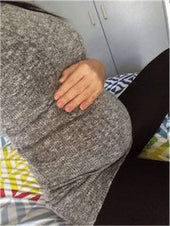Frozen sperm as good as fresh for IVF treatment
A recent study published in PLOS ONE finds that frozen sperm retrieved via testicular biopsy is as good as fresh sperm in leading to a successful pregnancy through IVF. The finding should make it easier to organize IVF procedures and increase options for infertile couples.
IVF (in vitro fertilization) is a technique that helps couples with fertility problems to have a baby. During the procedure, an egg is removed from the woman's ovaries, fertilized in a lab dish with sperm from the man, and the fertilized egg or embryo is then placed in the woman's womb to grow and develop.
If the man has a low sperm count or no sperm in his semen at all - for example because of an inherited disorder or as a result of cancer - then viable sperm has to be retrieved directly from the testicle with a biopsy. This is then either used straight away as fresh sperm, or frozen for future use.
The procedure is called intracytoplasmic sperm injection (ICSI) and involves injecting a single sperm into the egg, instead of adding the sperm to the egg in a lab dish.
If fresh sperm is used in the ICSI procedure, then events concerning both partners have to be synchronized precisely to maximize the chances of a successful pregnancy.
But if frozen sperm can be used, then this simplifies the overall IVF process considerably, from a number of angles. For instance, from the timing angle, the man can give his sperm in advance, and from the location angle, the biopsy may not have to take place at the same clinic or surgery as the one the woman must attend.
Kenan Omurtag, first study author and assistant professor of obstetrics and gynecology at Washington University School of Medicine in St. Louis, told the press: "The convenience and ease of being able to use frozen sperm taken by biopsy in ICSI offers many advantages over fresh sperm.
" When the procedure uses fresh sperm, the man has to undergo the testicle biopsy either the same day or the day before the egg is retrieved from the woman, and this may not be convenient for them.
If frozen sperm is used, then the man can have the biopsy, and if sperm is found, it can be frozen for later use. Then, at a time convenient for the couple, the woman has her eggs harvested, and the rest of the ICSI, where the sperm is injected into the egg, can take place.
The issue of convenience is important because it is not just a matter of the woman dropping into the clinic when she happens to feel like it. Before her eggs can be harvested, she has to have hormone injections every day for 7 to 10 days to stimulate her ovaries. And when the eggs are ready to be harvested, the doctor finds them with an ultrasound scanner, and removes them with a very thin, hollow needle.
For their study, Omurtag and colleagues analyzed 15 years of data from the Washington University Infertility and Reproductive Medicine Center.
Of 136 men who underwent ICSI, 84% of the procedures used frozen sperm and the rest used fresh sperm.
The researchers found that frozen sperm performed as well as fresh sperm in ICSI in terms of pregnancy success rate, despite there being a statistically significant difference in fertilization rate (frozen sperm 62%, fresh sperm 47%).
They also found that the type of center or clinic where the sperm was taken and its distance to the IVF lab also made no difference to pregnancy success rates. The participants in this study underwent their testicular biopsies either in an operating room next to the IVF lab, an operating room in another building a mile from the IVF lab, or an ambulatory center 15 mile from the IVF lab.
Co-author and professor of obstetrics and gynecology Randall Odem says: "This study demonstrates that using frozen sperm taken by biopsy works as well for most patients in what matters most - pregnancy rates.
" Researchers in Belgium recently showed it is also possible to develop a low-cost IVF procedure that could perform one treatment cycle for just over $250, making it accessible to many people around the world who cannot afford the conventional method, which in the US costs around $12,400 per cycle.
Written by Catharine Paddock PhD ( http://www.medicalnewstoday.com/)











